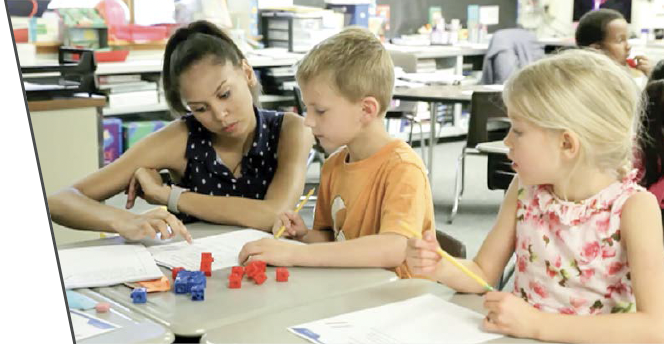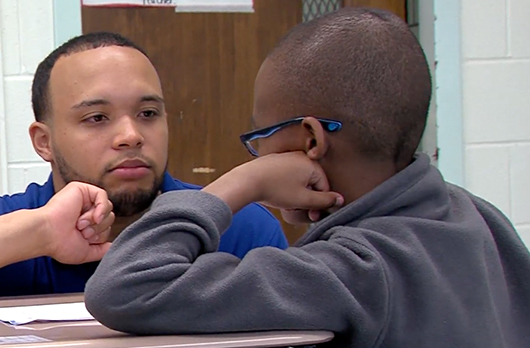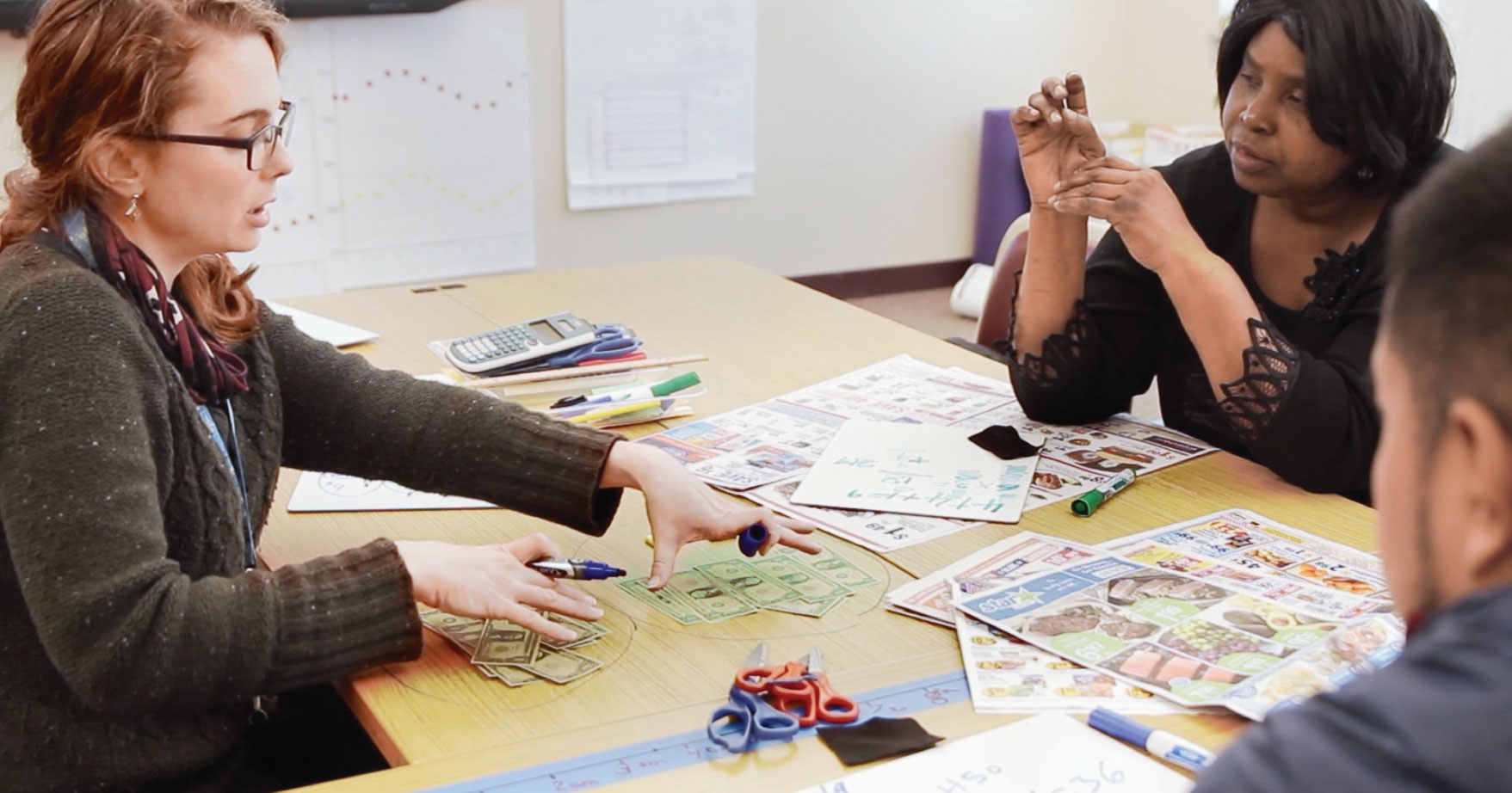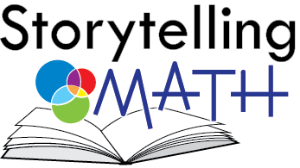TERC Blog
A Framework for Using Mathematics Curriculum to Support Equity
For the past three years the project staff of the Investigations Center for Curriculum and Professional Development, along with consultants whose work focuses on equity and inclusion, has been studying literature that addresses issues of equity, access, identity, and agency in mathematics education.

During this study, we have been asking ourselves:
- How can a mathematics curriculum be a tool for anti-racist work?
- How can Investigations or any mathematics curriculum, better support students who have been historically marginalized, especially Black and brown students, to be doers of mathematics?
Based on our reading and discussions among ourselves and with others who are engaged in equity work in different contexts, we developed a framework for our own work as we develop enhancements to the Investigations curriculum and to professional development that supports the curriculum. We were also guided by Aguirre et al.’s (2013) equity-based practices, and the implementation steps from the NCSM/TODOS joint position paper, Mathematics Education Through the Lens of Social Justice (2016).

We have identified four categories for reflection and action as we think about how mathematics curriculum can be a tool for promoting equity:
- Deep and Rigorous Mathematics
- Equitable Participation in a Collaborative Mathematical Community
- Strength-based Assessment and Accommodation
- Connections to Students, Their Families and Communities
This article introduces the four categories of the framework and their importance for equity and access in mathematics teaching and learning. A more detailed description of the framework is on the Investigations website — investigations.terc.edu/equity
Four Categories to Guide Equitable Mathematics Education
1. Deep and Rigorous Mathematics
Equitable teaching and learning of mathematics can only proceed in an environment where students engage deeply with significant mathematical ideas, develop conceptual understanding of those ideas, participate in mathematics activities with high cognitive demand, and experience the joy and beauty of mathematics. Development of students’ identity and agency as mathematicians requires consistent, ongoing opportunities to think through unfamiliar problems, build and use a repertoire of representations, recognize connections among mathematical ideas, look for patterns and regularities, make conjectures and mathematical arguments, and ask new questions, as well as confidently apply known procedures to familiar problems.
Why consider this topic in relation to issues of equity?
Mathematics is often assumed to be a field for only select people who are born with a “math gene.” In particular, Black and brown students have been historically excluded from engaging in rigorous mathematics. Rochelle Gutiérrez notes how a focus on an “achievement gap” rather than a focus on excellence and advancement results in “a static notion of student identity (as quantifiable in terms of race, class, gender, language, etc.) and ignores the multiple identities and agency of students (2008, p. 359).” As Lisa Delpit says in Multiplication is for White People (2012), “What happens when we assume that certain children are less than brilliant? Our tendency is to teach less, to teach down, to teach for remediation (p. 6).”
The first guiding principle of the Investigations curriculum, which has remained our primary principle since the first edition was published in the 1990s, is: “Students have mathematical ideas.” In part of the description of that principle (Implementing Investigations, p. 4, at each grade level), we state, “if given the opportunity to learn in an environment that stresses making sense of mathematics, students build on the ideas they already have and learn about new mathematics they have never encountered.” Without the opportunity to engage with interesting, deep, and rigorous mathematics content and an orientation in instruction to building on how students make sense of that content, there can be no equity.
2. Equitable Participation in a Collaborative Mathematical Community
A strong collaborative mathematics community gives students the opportunity to work together to solve problems, to learn from each other, to take risks, to support and encourage others, and to be supported and encouraged by others in their growth as math learners. In a collaborative learning environment, students play an active role in their learning. Students have opportunities to decide how they are going to solve problems, to select tools and materials, and to choose which activities they work on. They are invited to keep thinking about mathematical ideas that come up in class and to ask their own mathematical questions. Equitable participation in this community means that all students have the opportunity to express their ideas, to revise and build on them, to have others respectfully listen to and engage with their ideas, and to be seen as mathematical thinkers who make meaningful contributions to classroom conversations. Having one’s ideas taken seriously and taken up publicly supports students’ identity and agency as mathematicians.
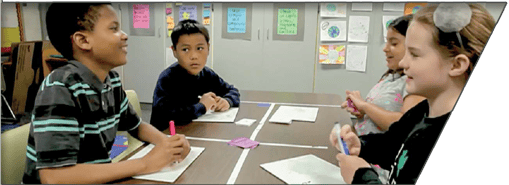
Why consider this topic in relation to issues of equity?
Students who have been historically marginalized in mathematics may not see themselves as powerful in relationship to mathematics and may not be perceived as having mathematical ideas that contribute to the community. The classroom environment can have a particularly large impact on these students: “Students experience mathematics classrooms as racialized spaces, where Black and Latina/o students are subject to negative stereotypes about their ability to do mathematics (Nasir, 2016, p. 11).” Teachers and students alike may have unexamined, implicit biases about whether students of color, emergent bilingual students, girls, or neurologically diverse students can be “good at math.” This can impact whose ideas are shared, taken up, and treated as mathematically powerful. Therefore, we need to consider how to create a classroom community where students who have been subjected to these stereotypes feel their ideas are respected, are comfortable sharing their ideas, and feel safe taking risks.
3. Strength-based Assessment and Accommodation
All students come to the classroom knowing and understanding some aspects of mathematics. Work with students begins with what they know and understand, with what makes sense to them, with what they are able to do. Having someone recognize and appreciate one’s knowledge and ability as a math thinker develops and builds one’s mathematical identity. In addition, this information is what enables teachers to support the range of learners in the classroom, to provide responsive accommodations that are truly (and not overly) helpful. Such accommodations help students engage deeply with the mathematics. Because students come to any classroom with a range of different experiences, needs, strengths, and challenges, strength-based accommodations are designed to support and extend the student’s competencies, contributions, and modes of communication.
Why consider this topic in relation to issues of equity?
Strength-based approaches to student learning build on students’ knowledge and experience. Labels, such as “low group,” “high flyers,” and “gifted,” support a deficit view of certain students and “perpetuate static views about children and their mathematics competencies. Eliminating the deficit discourse by focusing on learning rather than labels is a key step toward a more just and equitable mathematics education (NCSM/TODOS, 2016, p. 2).” Students who have been historically marginalized are more often deemed in need of interventions that focus only on facts and memorization rather than deep mathematics. Over-scaffolding for these students results in tasks with low cognitive demand and a lack of opportunity to learn rigorous mathematics. Aguirre et al. (2013) point out that “Equity does not mean that every student should receive identical instruction. Instead, equity demands that responsive accommodations be made as needed to promote equitable access, attainment, and advancement in mathematics education for each student (p. 9).”
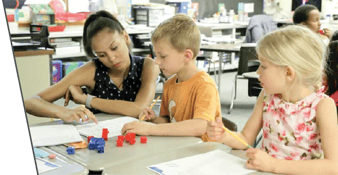
4. Connections to Students, Their Families and Communities
Students need to see themselves, their families and communities—as well as those from other communities—as doers of mathematics. In other words, math class should provide students with mirrors for seeing themselves in the mathematics, and windows for seeing the lives of others (Gutierrez, 2007). When students feel connected to and invested in the mathematics they are engaging in, this personal connection positively impacts their mathematical identities and sense of agency. This sense of agency is critical in order “to nurture a democratic society where all can use, know, and understand mathematics to comprehend and critique the world through mathematics and to experience its wonder, joy, and beauty (NCTM, 2020, p. xiv).”
Why consider this topic in relation to issues of equity?
The joint statement from NCTM and TODOS (2016) challenges us to think more deeply about how to make these connections: “A social justice approach to mathematics education assumes students bring knowledge and experiences from their homes and communities that can be leveraged as resources for mathematics teaching and learning (p. 2).” Students who have been historically marginalized in mathematics often do not have opportunities to see themselves in the mathematics they are engaging in and therefore do not see connections between the math and their lives. They are not encouraged to bring their full selves and the experiences of their families and communities into school and do not have the opportunity to develop what Su (2020) calls “mathematical affection”: “To miss out on mathematics is to live without an opportunity to play with beautiful ideas and see the world in a new light. To grasp mathematical beauty is a unique and sublime experience that everyone should demand (p. 8).”
One way to achieve this is to help students see their own experiences as part of the mathematics they are doing and to see mathematics as useful to their lives. Working on mathematics set in contexts that are familiar or of special interest can help students engage with and make sense of the math and see math as useful and powerful. As Gutierrez (2007) writes, “students [should] find mathematics not just ‘real world’ as defined by textbooks or teachers, but also meaningful to their lives (p 3).”
The Framework and Additional Resources
The framework is offered as a resource for reflecting on issues of equity, identity, and agency in mathematics learning and teaching. Just as we’ve found it helpful to engage with colleagues for support and challenge in our discussions, school-based educators may find it generative to discuss this framework with colleagues and apply it to their own context. The full framework along with additional equity resources, including blogs about supporting equitable mathematics communities are available on the Investigations website — investigations.terc.edu/equity
Authors
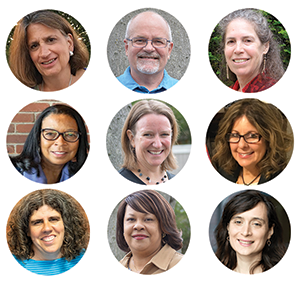
The Investigations Equity Team, above: Top row, from l to r: Karen Economopoulos, Keith Cochran, Susan Jo Russell. Middle row: Lynne Godfrey, Megan Murray, Marta Garcia. Bottom row: Arusha Hollister, Lorraine Brooks, Annie Sussman.
The Investigations staff, together with consultants whose work focuses on equity, are developing resources designed to support teachers and educators in thinking about issues of equity, access, identity, and agency in the Investigations classroom.

References
Aguirre, J., Mayfield-Ingram, K., & Martin, D. B. (2013). The impact of identity in K-8 mathematics. National Council of Teachers of Mathematics.
Delpit, L. (2012). “Multiplication is for white people”: Raising expectations for other people’s children. The New Press.
Gutiérrez, R. (2007). Context matters: Equity, success, and the future of mathematics education. In Lamberg, T., & Wiest, L. R. (Eds.), Proceedings of the 29th annual meeting of the North American chapter of the International Group for the Psychology of Mathematics Education (pp 1 - 18). Reno: University of Nevada.
Gutiérrez, R. (2008). A “gap-gazing” fetish in mathematics education? Problematizing research on the achievement gap. Journal for Research in Mathematics Education, 39(4), 357-364.
Nasir, N. S. (2016). Why should mathematics educators care about race and culture? Journal of Urban Mathematics Education, 9(1), 7–18.
National Council of Supervisors of Mathematics and TODOS: Mathematics for ALL. (2016). Mathematics education through the lens of social justice: Acknowledgment, actions, and accountability. Retrieved from https://www. mathedleadership.org/docs/resources/positionpapers/ NCSMPositionPaper16.pdf
National Council of Teachers of Mathematics. (2020). Catalyzing change in early childhood and elementary mathematics: Initiating critical conversations. National Council of Teachers of Mathematics.
Su, F. (2020). Mathematics for human flourishing. Yale University Press.
TERC. (2017). Implementing Investigations. Investigations in Number, Data, and Space®, (3rd ed.). Savvas Learning Company.

